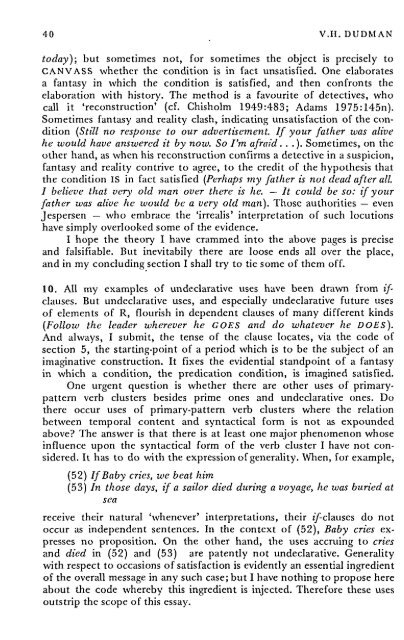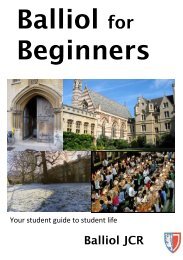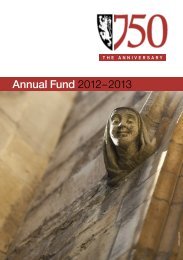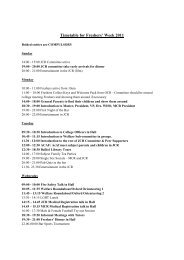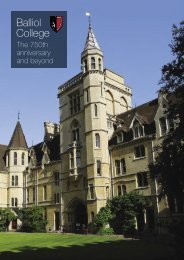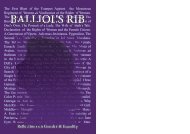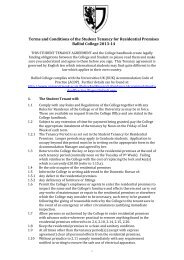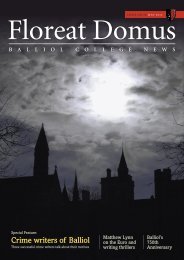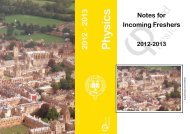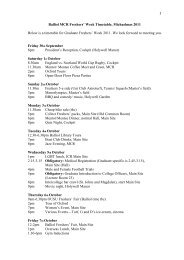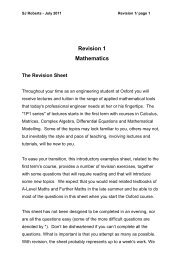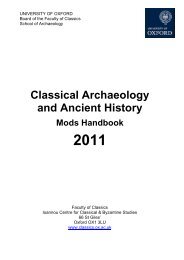TENSE AND TIME IN ENGLISH VERB CLUSTERS OF THE ...
TENSE AND TIME IN ENGLISH VERB CLUSTERS OF THE ...
TENSE AND TIME IN ENGLISH VERB CLUSTERS OF THE ...
- No tags were found...
You also want an ePaper? Increase the reach of your titles
YUMPU automatically turns print PDFs into web optimized ePapers that Google loves.
40 V.H.DUDMAN<br />
today); but sometimes not, for sometimes the object is precisely to<br />
CANVASS whether the condition is in fact unsatisfied. One elaborates<br />
a fantasy in which the condition is satisfied, and then confronts the<br />
elaboration with history. The method is a favourite of detectives, who<br />
call it 'reconstruction' (cf. Chisholm 1949:483; Adams 1975:145n).<br />
Sometimes fantasy and reality clash, indicating unsatisfaction of the condition<br />
(Still no response to our advertisement. If your father was alive<br />
he would have answered it by now. So I'm afraid. . .). Sometimes, on the<br />
other hand, as when his reconstruction confirms a detective in a suspicion,<br />
fantasy and reality contrive to agree, to the credit of the hypothesis that<br />
the condition IS in fact satisfied (Perhaps my father is not dead after all.<br />
I believe that very old man over there is he. — It could be so: if your<br />
father was alive he would be a very old man). Those authorities — even<br />
Jespersen — who embrace the 'irrealis' interpretation of such locutions<br />
have simply overlooked some of the evidence.<br />
I hope the theory I have crammed into the above pages is precise<br />
and falsifiable. But inevitabily there are loose ends all over the place,<br />
and in my concluding section I shall try to tie some of them off.<br />
10. All my examples of undeclarative uses have been drawn from ifclauses.<br />
But undeclarative uses, and especially undeclarative future uses<br />
of elements of R, flourish in dependent clauses of many different kinds<br />
(Follow the leader wherever he GOES and do whatever he DOES).<br />
And always, I submit, the tense of the clause locates, via the code of<br />
section 5, the starting-point of a period which is to be the subject of an<br />
imaginative construction. It fixes the evidential standpoint of a fantasy<br />
in which a condition, the predication condition, is imagined satisfied.<br />
One urgent question is whether there are other uses of primarypattern<br />
verb clusters besides prime ones and undeclarative ones. Do<br />
there occur uses of primary-pattern verb clusters where the relation<br />
between temporal content and syntactical form is not as expounded<br />
above The answer is that there is at least one major phenomenon whose<br />
influence upon the syntactical form of the verb cluster I have not considered.<br />
It has to do with the expression of generality. When, for example,<br />
(52) If Baby cries, we beat him<br />
(53) In those days, if a sailor died during a voyage, he was buried at<br />
sea<br />
receive their natural 'whenever' interpretations, their 2/-clauses do not<br />
occur as independent sentences. In the context of (52), Baby cries expresses<br />
no proposition. On the other hand, the uses accruing to cries<br />
and died in (52) and (53) are patently not undeclarative. Generality<br />
with respect to occasions of satisfaction is evidently an essential ingredient<br />
of the overall message in any such case; but I have nothing to propose here<br />
about the code whereby this ingredient is injected. Therefore these uses<br />
outstrip the scope of this essay.


